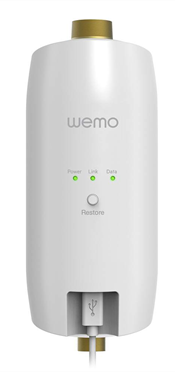Consumer electronics giant Belkin has announced its latest move to create the smart home of the future: a $40 million joint venture to bring “advanced water sensing and conservation technology” to market.
The new joint venture, which goes by the name of Phyn and will be based out of Los Angeles, has been set up in conjunction with Uponor, a Finnish supplier of plumbing for residential and commercial properties.
Founded in 1983, California-based Belkin is a veritable dinosaur in Internet company terms, but it has emerged as a major player in the connected devices realm through its Wemo brand of motion sensor, switches, cameras, cookers, light bulbs, and more.

Above: Wemo Water
The genesis for Belkin’s new joint venture seems to have been the Wemo Water, a device announced more than a year ago that has yet to make it to market. The Wemo Water was touted as a single-sensor device that helps users monitor their water consumption through sensing changes in pressure that occur throughout a house’s plumbing system whenever water is used.
AI Weekly
The must-read newsletter for AI and Big Data industry written by Khari Johnson, Kyle Wiggers, and Seth Colaner.
Included with VentureBeat Insider and VentureBeat VIP memberships.
Phyn-ders keepers
Belkin will own 62.5 percent of the new Phyn company and will transfer over all its existing water-related technology, intellectual property, assets, and employees. Uponor will invest $15 million in the new venture in exchange for the remaining 37.5 percent, meaning that Belkin values its non-monetary investment at $25 million. But together, they’re setting out to create the Nest of household water.
Though Phyn will be headquartered in LA, it will also host a research and development (R&D) lab in Seattle, and a number of existing Belkin engineers will move directly to the new Phyn venture.
The so-called Internet of Things (IoT) is ushering in all manner of random connected products, including fridges, doorbells, and beds, but Phyn hopes to move beyond convenience and capitalize on growing concerns about predicted global water shortages. WWF estimates that 48 countries will be impacted by “water stress or scarcity” by 2025, something it anticipates will affect more than a third (35%) of the global population. Phyn wants to help households conserve water through detecting leaks and serving up meaningful data on domestic water wastage.
“Water is a precious and vital natural resource, but there has been a fundamental lack of technology dedicated to protecting and preserving it — especially for home users,” said Chet Pipkin, founder and CEO of Belkin. “With the creation of Phyn, we’re bringing water up to speed with the rest of the smart home, helping to not only protect consumers’ homes and wallets, but also do our part to solve the very real challenges facing our global water supply.”
The Wemo Water product still hasn’t yet made it to market almost a year and a half after it was first unveiled, and it seems the formation of this new joint venture hasn’t expedited matters. A spokesperson said that there is still no timetable for the first product launch, though a beta program is likely to kick off later this year.
“With our rich background in consumer IoT, sensor and machine-learning, coupled with expertise in water delivery infrastructure, our dedicated team is ideally positioned to scale and deploy an intelligent water solution that sets a new bar for reliability, accuracy and intuitive user experience right out of the gate,” added Ryan Kim, former vice president of engineering at Belkin and current CEO at Phyn.
But all this leads us to one question. Why would Belkin, a company that’s already pushing hard into the IoT realm, break out its technology into a third-party company in which it’s nothing more than a shareholder? Surely it would make sense to continue doing everything in-house at Belkin?
“Spinning off this technology as a new joint venture with the backing of Uponor will enable Phyn to create a dedicated team with the resources to scale the technology accurately and reliably for the consumer market,” Kim told VentureBeat. “Its singular focus will enable it to grow and develop faster than it would if it remained under Belkin.”
In other words, Belkin doesn’t feel like it has enough resources to properly scale the business, and by handing the technology over to a company with specific expertise in this field, it stands a better chance of succeeding.
“Taking on a partner such as Uponor with their relationships and reputation in the plumbing services industry is key to taking the technology where we want to go,” Kim said.
VentureBeat's mission is to be a digital town square for technical decision-makers to gain knowledge about transformative enterprise technology and transact. Learn More
